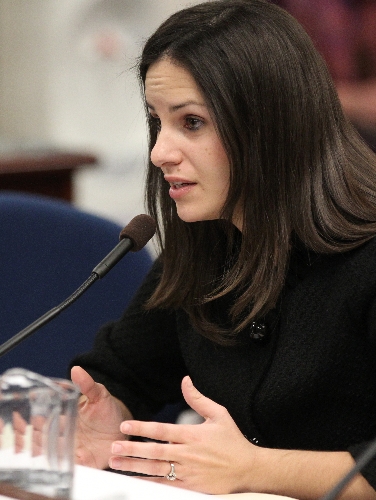Stolen Valor bill would punish impostors

Vietnam War veteran Bill Anton made a heartfelt plea Friday to the state Senate Judiciary Committee, seeking to make it criminal fraud for impostors who wear unearned valor medals, lie about their service or masquerade as members of the armed forces to obtain anything of value.
While there is no price tag on valor required to earn certain medals or on the honor of war heroes, it was clear from the tone of his testimony, his voice cracking with emotion, that those things have value for veterans.
Military medals and honor and the reputation associated with them are priceless, said Anton and others who testified. It doesn’t matter whether the value of the fraud is a free meal, a parking spot reserved for disabled veterans or hundreds of thousands of dollars stolen from the Department of Veterans Affairs by someone who made false claims using phony documents.
“We have other fraud statutes but want to close the loophole for our men and women in uniform and veterans. Please give the military and veterans the honor and respect they deserve,” Anton told the committee.
The Nevada Stolen Valor Act, if passed by the Legislature, would close the free-speech loophole of the federal Stolen Valor Act that Congress approved in 2006. A U.S. appeals court in San Francisco has deemed the federal Stolen Valor law unconstitutional.
The Nevada Senate bill and a companion one in the Assembly “follows the 9th Circuit on fraud and doesn’t touch freedom of speech,” said Anton, a retired lieutenant colonel from North Las Vegas, who’s in the Army Ranger Hall of Fame.
Brian O’Callaghan, a Las Vegas police officer, and Daryl Capurro, likewise offered support.
“I think it’s an insult to have someone claiming to have awards and commendations they didn’t receive. That’s more than just a little white lie,” said Capurro, a Vietnam War vet and member of the Board of Wildlife Commissioners.
O’Callaghan, whose son is about to be deployed, said Nevada needs a Stolen Valor Act for a number of reasons, not the least of which is to prevent military phonies from landing jobs.
“We’re concerned about fraud and veterans preference points,” O’Callaghan said.
Rebecca Gasca, a lobbyist for the American Civil Liberties Union of Nevada, argued against the measure, saying it doesn’t define “something of value” — although the bill cites examples such as using false military representation to obtain employment or get elected or appointed to public office.
Gasca noted that even making false representation to get a free breakfast at a Denny’s restaurant would be illegal.
“It is a shameful thing,” she said. “But we should have to put up with things that are distasteful. The Constitution says those things are OK.”
Anton cited recent examples of why Nevada needs a law to prevent someone getting employment or elected or appointed to public office using false military claims.
He mentioned the case of Sen. Richard M. Blumenthal, D-Conn., a Marine Corps reservist, who falsely claimed to have served in the Vietnam War while campaigning.
He later retracted those claims.
Anton also referenced a story Friday about William Northrop, who was hired as the commandant of the Oak Ridge Military Academy in North Carolina after falsely claiming to have served with the Special Forces in Vietnam. There is no record he ever served in the U.S. military let alone Vietnam.
Anton, who provided language for the Nevada bills, said he’s disgusted about the Northrop revelation. As for Blumenthal’s self-proclaimed misstatements, Anton said, “I think that’s pitiful.”
Anton’s perseverance of a Nevada Stolen Valor Act stems from two cases in the West.
In December, a U.S. District Court judge sentenced Air Force veteran and former Veterans Affairs clerk David M. Perelman to a year in prison for fraudulently obtaining a Purple Heart medal, which he used to steal $180,000 in disability benefits. Perelman pleaded guilty in August to theft of government funds, a felony, and unlawful wearing of a service medal, a misdemeanor. It was the first known prosecution in Nevada under the federal Stolen Valor Act.
During sentencing U.S. District Judge Kent Dawson allowed Perelman to retain his right to appeal the constitutionality of the Stolen Valor Act of 2005 even though he ruled the circumstances in his case differed from free-speech rights that were at issue in the California case of Xavier Alvarez, whose stolen valor conviction was overturned by the 9th U.S. Circuit Court of Appeals.
The Senate Judiciary Committee took no action Friday.
Contact reporter Keith Rogers at krogers@ reviewjournal.com or 702-383-0308.












